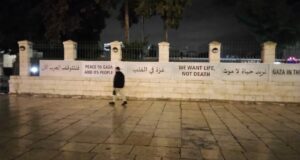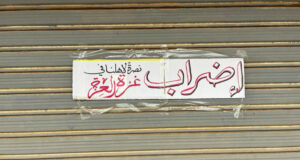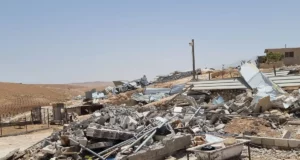The following is not an attempt at a comprehensive analysis of the current situation in the Occupied Territories of Palestine. Instead, it is a reflection on the past few weeks I have spent with the International Solidarity Movement in the city of Hebron and its environs and what brought me here in the first place. It is completely subjective and deliberately intended to be so. I am a firm believer that the shortest distance between a person and the truth is a story. Many stories I have heard and read about regarding resistance to occupation, capitalism, imperialism have formed my sense of what is right and wrong – and on which side of the fence I am on. So if you manage to read through this lengthy piece of writing, I hope the stories of resistance I have encountered over the past few weeks will also inspire you also to keep on fighting the powers that be, wherever and whenever you encounter them.
(Part 1/3)
It’s 8 a.m., Tuesday morning, and the city of Hebron – in the southern region of the West Bank of Palestine, has awoken. The initial morning calls to prayer from the surrounding mosques have well passed, a few Palestinian workers are wiping sleep from their eyes and some seem like they are in sleep-walking mode as they journey to work on foot from the heavily-militarised H2 Israeli district to the Palestinian Authority controlled H1 section.
It could be any other city in the world given the evident rituals of work, rest, and play – that is apart from the blatantly obvious fact that the city of Hebron is under a brutally repressive, 6,000 Israeli soldier strong, military occupation. And these soldiers are here to ‘protect’ the 600 or so settlers who live in the H2 area, which makes up 20% of all Hebron. Approximately 40,000 Palestinians lived in the area in 2005 but this number is steadily decreasing due to ever-increasing repression and violence
It is the first time I have ever lived in an occupied country. Even though I am from Ireland, the occupation of the Northern part of our country was a universe away for those of us who grew up in the southern Republic. Images that flashed on the screen on a daily basis when I was growing up remained just that – flashes on a screen. The impact of the Northern Ireland conflict on Irish society as a whole was nowhere to be seen, and was especially far removed from my home town, 130 kilometres away from the border. Yet, for those who have resisted imperialism and capitalism in the North of Ireland, the symbols of the Palestinian people and their struggle – which can be found in Republican areas of Northern Ireland – embody the universal spirit for true freedom. Fights against oppressive conditions tend to identify with each other easily and employ each others’ symbols in a clear manifestation of mutual solidarity. Hence, one can also see the Kurdish flag and Basque flag in a variety of districts in Belfast and Derry. That said, I have yet to see a tricolour here! But once one says they are from Ireland the amazing hospitality and friendliness of Palestinians elevates to even higher levels than normal.
Despite the fact that this is my first time in the Middle East, I have had previous voluntary experience in Haiti, where I worked for 3 months in early 2001. The stark poverty there and amazing spirit of survival manifested through their great sense humour and generosity was a significant eye-opener for a 21 year old from the midlands of Ireland. Haitians taught me many valuable lessons then about simple living, just as Palestinians have been teaching me invaluable lessons about their struggle since I arrived here almost 4 weeks ago. The domestic societal pressures I and other Westerners face, from San Francisco to Warsaw, Oslo to Madrid – whether to choose Nike or Adidas, Levis or Wranglers, Coca Cola or Pepsi – seems like such bullshit falsity when measured against the fact that it is ordinary Haitians who slave labour for our commodity overload and Palestinians who bear the brunt of our nation’s obsession with weapons sales to the Apartheid Israeli State.
Thankfully, groups like the ISM, Christian Peacemaker Team and many others exist to counter the exploitation and violence perpetuated by the political powerbrokers, cynical warmongers, and the ubiquitous capitalists.
In my own case, on return to Ireland after volunteering in Haiti, I had to decide whether I was to conform to the Irish Celtic Tiger economic expectation of attaining a brand-new 2.6 litre car, producing 2.3 children, constructing an 8 room house (3 times more than required), signing up for a 35 year mortgage in a cramped urban space with few social services, and putting aside a sufficient quantity of disposable income for 2 sun holidays a year in order to make up for the eternally falling rain in Ireland – and all by the time I would have reached 27 years old. Yes, I know, sounds pretty boring! And yet many feel forced into such economic and social traps, and of course not just in Ireland, by well-groomed real estate charmers, loan sharks and city councillor land rezoners, just because they want to start a family and bring up their kids in a secure environment.
That course of life may seem good to some, and more power to them if they can enjoy themselves and be active citizens at the same time. But for those of us who have had the privilege to form relationships with those who struggle to survive in their daily lives, whether amongst the poor and oppressed of the Global North or South, our responsibilities to respond through sharing some of their experiences and refusing to descend into slumber are to the fore of consciences. And that is exactly why I decided to come to Palestine (I know, it has taken me a while to get to this point) – to reignite my sense of responsibility towards the other, to develop mutually beneficial relationships with those having to confront occupation and violence in their normal daily rituals – of work, rest, and play. A Russian Israeli soldier recently sarcastically commented to me at Tel Rumeida checkpoint in Hebron, ‘so you’re like Jesus!’
Maybe it had more to do with the fact I hadn’t shaved for 10 days then what he perceived as an activist’s sense of moral superiority (though most human rights activist’s I’ve met are a very humble bunch). I ain’t no Jesus, and I hammer this home to the soldier calmly. I replied: ‘Well, for sure I’m not Jesus, but don’t forget either that at least he never carried a weapon with him nor harassed people!’ I doubt it resonated. He’s the same soldier that I mentioned earlier who guzzles back beer while on duty and harasses us with his armed buddy when we film him being abusive.
Anyhow, enough about soldiers. Thankfully I was free to come here, albeit for a short period of time, having no mortgage, kids (the only part of this triangle I would like to have) nor gas-guzzling car – and having a very understanding and supportive girlfriend and family to support me. I look upon it as a huge privilege and yet great challenge and responsibility to be able to travel and experience resistance against occupation by the people here. They have much to teach us who live in countries ridden with individualism and materialism.
Even though I’m from Ireland, for the past two years I have been residing in Poland, teaching English and desperately struggling to learn the nightmarish Polish language. So when I decided to initiate contact with the ISM about the possibilities of working alongside them in Palestine, I started to recall previous stories of theirs which I had followed. A good friend of mine had been shot in the leg by an IOF soldier in 2002 while others had volunteered as short-termers. Last year I attended a very well produced play in Ireland which was based on the journals by the very inspiring ISM’er Rachel Corrie. And before I left Poland by train to make my way here I just managed to finish reading Jocelyn Hurndall’s book about her son Tom, fatally shot by an IOF soldier in the Gaza Strip in 2003, just shortly after Rachel had been murdered.
 International Solidarity Movement Nonviolence. Justice. Freedom.
International Solidarity Movement Nonviolence. Justice. Freedom.


